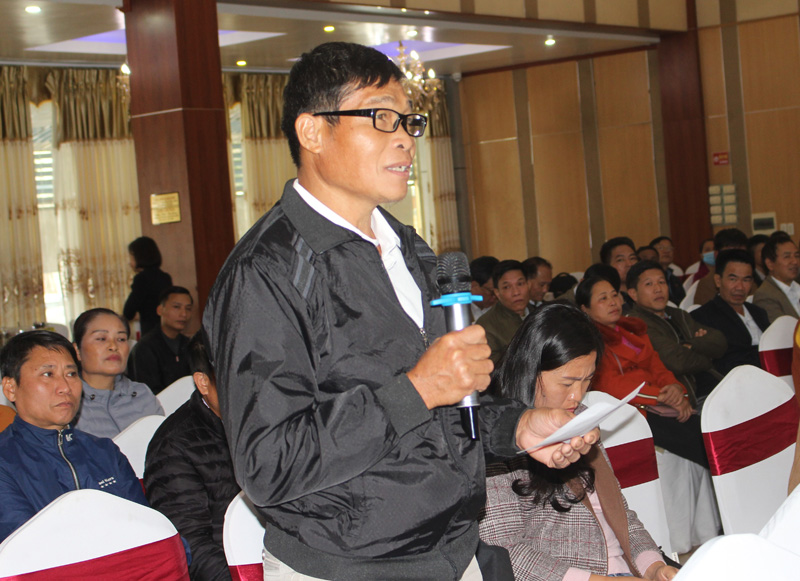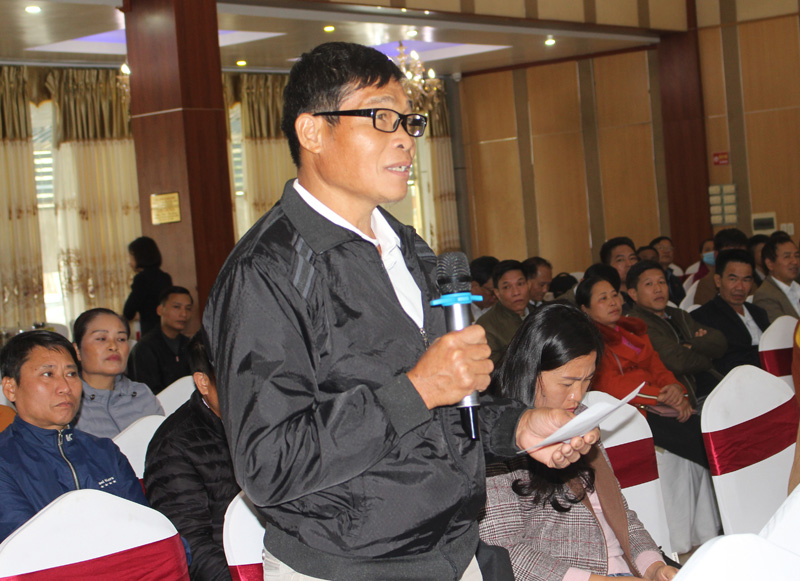
(HBO) - Developing poultry farming in conformity with criteria of the "One Commune, One Product” programme in the northern mountainous region was the focus of an forum held in Hoa Binh province on December 4 by the National Agricultural Extension Centre and the provincial Department of Agriculture and Rural Development.
 Farmers take part in
and give ideas at the event.
Farmers take part in
and give ideas at the event.
In 2020,
Vietnam has a total of 481 million of poultry, including 382 million of
chickens, or 79.5 percent.
By the end
of November, Hoa Binh had been home to 7.8 million poultry, which are mainly
local varieties of Lac Thuy and Lac Son districts.
For animal
husbandry, the OCOP programme helps promote specialties of each locality.
Locals and collectives are owners of brands and directly earn profits from
their products.
However,
the farming of specialty chicken varieties is primarily at households. They are
facing obstacles in terms of investment, technology, farming scale, production,
trade promotion and intellectual property registration.
At the same
time, the planning and development of specialty chicken varieties in keeping
with the OCOP programme in localities are lagging behind.
The forum
aimed to foster planning of farming areas and calling for the building of product
linkages; to develop poultry farms in a bid to add values to and diversify
products in line with the OCOP programme; and to re-organise production
activities and raise quality of products.
It also
offered chances for farmers to discuss with authorities, scientists and
businesses in an attempt to devise solutions to difficulties in poultry
farming, notably techniques to treat common diseases, application of scientific
and technological advances, and measures to meet OCOP criteria.
Through the
forum, firms, cooperatives and households were able to promote their products
on mass media platforms./.
According to data from the Hoa Binh Provincial Party Committee, the industrial production index for the first six months of 2025 is estimated to have increased by 20% compared to the same period last year. This marks the highest year-on-year growth rate for this period since 2020.
In the first six months of 2025, Hoa Binh province’s export turnover was estimated at 1.145 billion USD, marking an 18.11% increase compared to the same period in 2024. Import turnover was estimated at $ 804 million, a 17.15% increase, which helped the province maintain a positive trade balance.
The lives of the ethnic minority farmers in Tan Lac district have gradually improved thanks to the new directions in agricultural production. This is a testament to the collective strength fostered through the professional associations and groups implemented by various levels of the district’s Farmers’ Union.
With the motto the "product quality comes first,” after nearly one year of establishment and operation, Muong village’s Clean Food Agricultural and Commercial Cooperative, located in Cau Hamlet, Hung Son Commune (Kim Boi district), has launched reputable, high-quality agricultural products to the market that are well-received by consumers. The products such as Muong village’s pork sausage, salt-cured chicken, and salt-cured pork hocks have gradually carved out a place in the market and they are on the path to obtaining the OCOP certification.
In the past, the phrase "bumper harvest, rock-bottom prices" was a familiar refrain for Vietnamese farmers engaged in fragmented, small-scale agriculture. But today, a new spirit is emerging across rural areas of Hoa Binh province - one of collaboration, organisation, and collective economic models that provide a stable foundation for production.
Maintaining growing area codes and packing facility codes in accordance with regulations is a mandatory requirement for agricultural products to be eligible for export. Recently, the Department of Agriculture and Environment of Hoa Binh province has intensified technical supervision of designated farming areas and packing facilities to safeguard the "green passport" that enables its products to access international markets.



 Farmers take part in
and give ideas at the event.
Farmers take part in
and give ideas at the event.